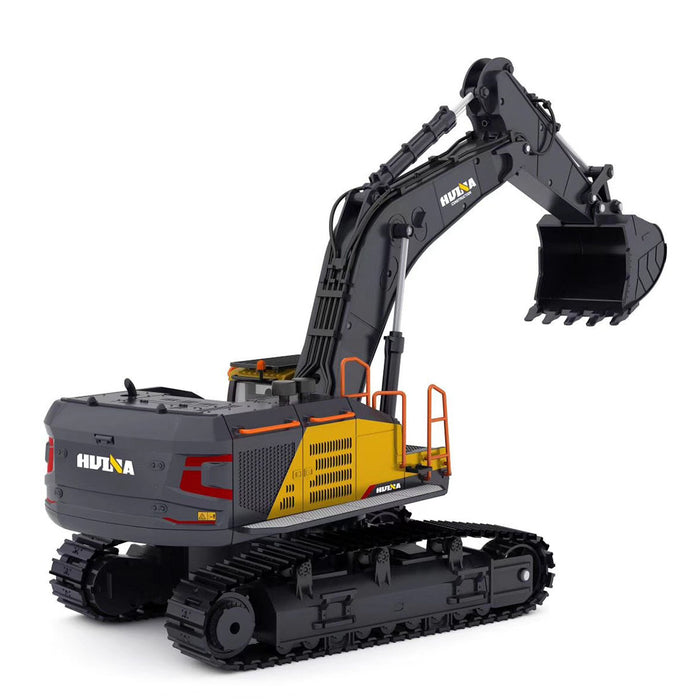What You Didn’t Know About the Safety Features of the remote control excavator
Comprehending Exactly How Excavator Works and Its Impact on Effectiveness
Excavators play a vital function in building and mining procedures, relying on a complicated interplay of hydraulic and mechanical systems. Their capacity to carry out a variety of tasks depends upon both their style and the modern technology integrated within. Recognizing these components can significantly influence operational performance and efficiency. As innovations remain to reshape the market, one must think about exactly how these changes will certainly influence future techniques and efficiency.
The Basics of Excavator Mechanics

The Role of Hydraulic Solutions in Excavators
At the heart of excavator operation exists the hydraulic system, which plays a critical function in powering the equipment's features and activities. This system makes use of pressurized hydraulic liquid to transfer energy, enabling different activities such as moving, digging, and lifting. By taking advantage of the concepts of hydraulics, excavators can do jobs with impressive precision and pressure, boosting total operational efficiency.The hydraulic system is composed of essential parts, consisting of pumps, cylinders, and shutoffs, which function together to control the flow and instructions of the fluid. When the driver involves the controls, the hydraulic liquid is directed to particular cyndrical tubes, translating the driver's commands into physical motion. This device enables for smooth and receptive actions, which are essential in construction and excavation atmospheres. double e volvo rc excavator. The performance of the hydraulic system directly impacts the productivity and convenience of the excavator, making it a vital aspect in modern excavation procedures
Secret Components of an Excavator
Comprehending the essential elements of an excavator is essential for grasping just how this powerful machine operates. An excavator consists of numerous significant components, including the undercarriage, house, bucket, arm, and boom. The undercarriage provides security and flexibility, typically including tracks or wheels to navigate different surfaces. Your home consists of the engine and hydraulic systems, enabling the operator to control movement and power the machine. The boom expands from your house, allowing vertical reach, while the arm links to the pail, helping with digging and training operations.Additionally, the taxicab houses the driver, outfitted with controls for accurate maneuvering. Each of these components plays a crucial function in the excavator's overall capability, contributing to its effectiveness and effectiveness on building and construction sites. Comprehending these components helps in optimizing and maintaining excavator performance, making sure jobs are finished securely and effectively.
Accessory Adaptability and Its Advantages
Accessory versatility is a crucial aspect of excavators, enabling drivers to switch over in between numerous tools tailored for certain jobs. This adaptability not just enhances work performance yet additionally contributes to cost-effectiveness by lowering the need for multiple equipments. Understanding the various kinds of accessories available can significantly affect the overall performance and performance of an excavator on job websites.
Kinds of Add-ons
While excavators are largely identified for their digging capacities, their true adaptability depends on the wide variety of accessories offered. These accessories enhance the excavator's capability, enabling it to do different jobs beyond excavation. Typical add-ons consist of buckets (for excavating and scooping), hydraulic thumbs (for realizing materials), and augers (for piercing openings) Grapples are made use of for moving and managing debris, while rippers can separate difficult surfaces. Various other specialized add-ons, such as plates and plows, make it possible for excavators to adapt to details task needs. This diversity not just raises the equipment's energy throughout various fields, consisting of landscaping, building, and demolition, however additionally permits operators to tailor their tools to satisfy particular project needs effectively.
Raised Task Effectiveness
Maximizing task efficiency is a primary advantage of utilizing various excavator attachments. Various add-ons permit an excavator to execute numerous tasks without needing to change equipment, saving valuable time and labor. For example, utilizing a hydraulic hammer can break concrete while a container accessory can excavate dirt, enabling a smooth operations. This versatility decreases downtime connected with tools changes and enhances productivity on-site. In addition, specialized attachments improve accuracy in tasks such as grading or landscape design, leading to higher top quality outcomes. The capacity to adjust to various job requirements not just simplifies procedures however also reduces the need for additional machinery, making certain that projects are completed quickly and properly. Generally, add-on convenience considerably contributes to boosted work performance in excavation job.
Cost-Effectiveness and Adaptability
Cost-effectiveness is a significant advantage of utilizing versatile excavator add-ons. These add-ons permit a single excavator to perform several tasks, lowering the demand for additional equipment and labor - double e volvo rc excavator. By changing in between buckets, i was reading this hammers, and grapples, operators can deal with various tasks, from excavating to demolition, therefore taking full advantage of tools usage. This flexibility not just lowers functional costs however likewise reduces downtime related to altering devices. Furthermore, the capacity to customize excavators with specialized add-ons improves efficiency, as they can effectively deal with diverse jobs according to job demands. In conclusion, the mix of cost-effectiveness and convenience in excavator accessories adds to boosted functional efficiency and resource allowance in construction and excavation jobs

Advanced Technology in Modern Excavators
Modern excavators are progressively outfitted with innovative modern technology that changes excavation processes. Automation enhances operations, while improved gas performance decreases operational expenses. In addition, smart control systems enhance precision and safety and security, noting a significant evolution in excavation tools.
Automation in Excavation Processes
As excavation modern technology progresses, automation has become a critical part in enhancing efficiency and precision on job sites. Modern excavators are furnished with innovative automated systems that facilitate jobs such as grading, excavating, and trenching with very little driver intervention. These systems use sensing units, GPS, and device knowing algorithms to guarantee accurate placing and deepness control, significantly reducing the margin for error. In addition, automation allows drivers to concentrate on critical decision-making instead of manual controls, leading to improved performance generally. Such developments not only simplify process however additionally improve security by decreasing human mistake in complex procedures. As a result, the combination of automation in excavation processes stands for a significant innovation in construction modern technology, driving the industry towards greater effectiveness and performance.
Boosted Fuel Performance
Improvements in technology have likewise led to substantial improvements in fuel performance for contemporary excavators. Modern devices are equipped with sophisticated engines that optimize power outcome while lowering gas usage. These engines utilize cutting-edge burning modern technologies, such as turbocharging and direct gas injection, to boost performance and effectiveness. Additionally, light-weight products in building lower general weight, permitting for less energy expenditure during procedure. The introduction of variable speed controls enables drivers to readjust engine performance according to particular jobs, better lessening fuel use. Because of this, these improvements not only reduced functional costs yet likewise add to ecological sustainability by lowering discharges. Overall, boosted fuel efficiency in excavators is an essential growth that reinforces performance and economic practicality in the construction market.
Smart Control Solution
While drivers navigate increasingly complex work sites, wise control systems in excavators have become crucial tools for improving performance and accuracy. These innovative modern technologies make use of sensing units and algorithms to check various criteria such as load weight, surface problems, and functional performance. By automatically adjusting hydraulic functions, wise systems enhance machine performance, leading to improved efficiency and decreased wear on elements. Furthermore, drivers take advantage of user-friendly interfaces that supply real-time feedback and diagnostics, enabling for notified decision-making. This combination of innovation not only click for more info streamlines procedures yet also decreases human error, contributing to much safer workplace. As the building and construction sector continues to progress, clever control systems will certainly play a vital duty fit the future of excavator effectiveness and efficiency.
Enhancing Functional Effectiveness With Excavators
Excavators play an essential function in enhancing operational efficiency throughout various construction and excavation tasks. Their adaptability enables multiple tasks, including training, material, and excavating handling, which enhances process and decreases the requirement for additional equipment. With powerful hydraulic systems, excavators can perform sturdy jobs with accuracy, considerably lowering the moment needed to total projects. The integration of innovative modern technology, such as general practitioner and automated controls, additionally enhances their operation, making it possible for drivers to attain higher accuracy and minimize product waste. Furthermore, modern-day excavators are created to consume less fuel and decrease exhausts, contributing to both price financial savings and environmental sustainability. By using excavators efficiently, construction groups can improve productivity, fulfill job target dates, and enhance overall website monitoring. This multifunctionality and effectiveness make excavators essential devices in the modern building landscape.
The Future of Excavators in Building and Mining Industries
As the construction and mining industries evolve, the future of excavators is poised for considerable transformation driven by technical innovation and transforming operational demands. Advances in automation and artificial knowledge are reshaping excavator capabilities, enabling improved accuracy and performance in procedures. Autonomous excavators are emerging, minimizing the requirement for human intervention and lessening the danger of accidents.Moreover, the integration of telematics and IoT technology allows real-time surveillance of maker efficiency and anticipating maintenance, optimizing uptime. Environment-friendly designs, including hybrid and electric designs, are obtaining traction, aligning with sustainability goals within the industry.Additionally, making use of innovative materials and lighter layouts boosts gas efficiency while maintaining performance requirements. As these fads progression, excavators will certainly play a vital function in fulfilling the raising needs for performance and security in building and mining, ultimately transforming operational landscapes.
Often Asked Concerns
How Do Weather Condition Conditions Affect Excavator Performance?

Weather substantially affect excavator performance, as rainfall and mud can prevent traction and stability, while severe temperatures might influence hydraulic systems. Operators needs to adjust to these variables to ensure excellent capability and safety and security throughout operations.
What Safety And Security Procedures Should Operators Adhere To While Utilizing Excavators?
Precaution Homepage for excavator drivers consist of using appropriate personal protective tools, performing pre-operation inspections, ensuring correct communication with ground employees, keeping a risk-free range from overhead threats, and adhering to well-known operational methods to avoid crashes.
Exactly How Usually Should Excavators Be Preserved for Optimum Performance?
Excavators must be kept consistently to ensure peak efficiency, normally every 250 operating hours or as defined by the supplier. Routine checks boost reliability, stop unanticipated break downs, and expand the life-span of the equipment.
What Is the Typical Lifespan of an Excavator?
The typical life-span of an excavator typically ranges from 10,000 to 15,000 hours of operation. Aspects affecting longevity consist of upkeep practices, running conditions, and the quality of the maker itself, affecting overall efficiency and performance.

Can Excavators Operate Irregular Terrain Efficiently?
Excavators can run properly on unequal surface due to their expressed styles and flexible tracks. These functions enable them to preserve security and traction, allowing reliable operation in difficult settings generally experienced in construction and landscaping projects. Each of these elements plays a vital function in the excavator's overall capability, contributing to its effectiveness and effectiveness on construction websites. Maximizing task performance is a key benefit of making use of numerous excavator add-ons. While drivers browse significantly complex task websites, clever control systems in excavators have actually arised as necessary tools for boosting effectiveness and accuracy. Excavators play an important function in improving functional effectiveness throughout different building and excavation tasks. Breakthroughs in automation and artificial intelligence are reshaping excavator capacities, permitting for enhanced precision and effectiveness in procedures.